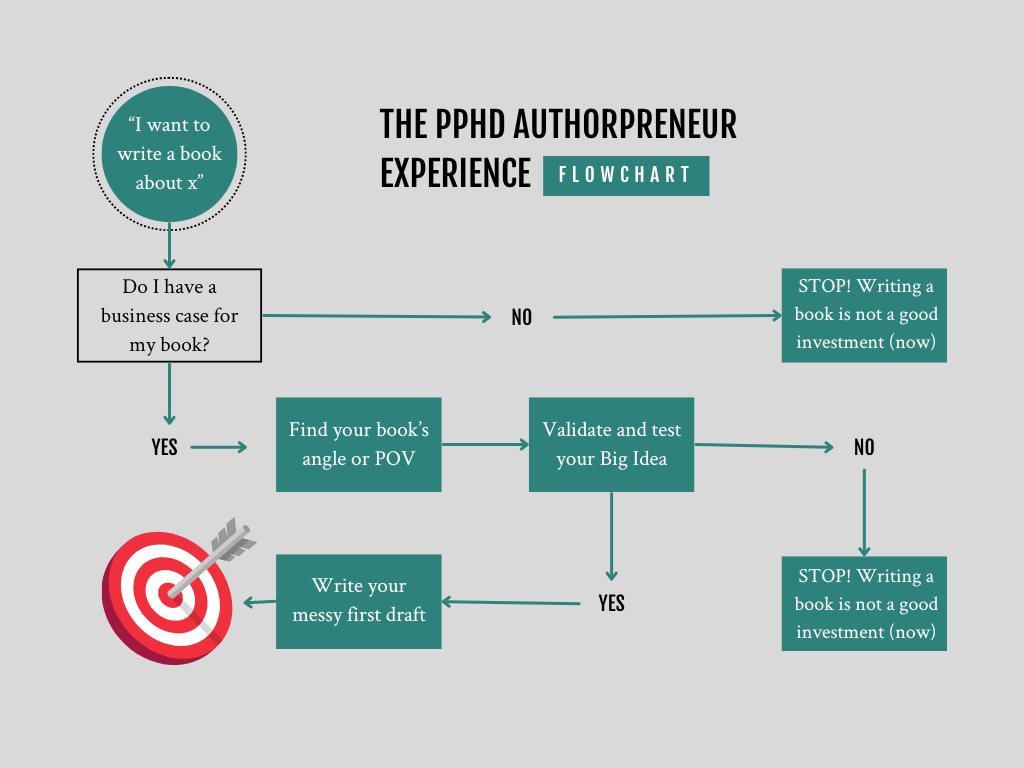Business Book Ghostwriting

Write a Book and Serve More People
You are in business to engage with people who need your knowledge and subject matter expertise.
You’re also writing your book for them.
Your target reader might be:
- A past version of you (if only you knew then what you know now…)
- Someone who needs to know there is another way (let’s shake up the status quo!)
- A colleague who could use some insider encouragement
Whatever your angle is, there is an audience waiting to:
- Hear your unique perspective
- Learn your methodology
- Walk away inspired to try something new

Write a Book that Sells
Lots of founders shy away from writing a book because they’re nervous about taking time away from their core business.
What’s a business book that sells?
Nothing fancy here, it’s a book that aligns with and moves you toward your business goals.

That’s why every book that comes through our ghostwriting process is guaranteed to:
1. Tie into your business strategy
2. Grow your audience WHILE we write it
3. Get your idea into the hands of people who need it
Phase 1: Find your Big Idea (months 1-3)
Phase 2: Write the book (months 4-12)
Once we find your unique angle, we will know whether you’re writing a Topic-Focused book or a Thought Leadership book.
Ghostwriting: Thought Leadership Book
Who’s it for?
This service is perfect for folks who know they have a book they want written and have one-hour per week for 4-12 months to dedicate to the work.
If you’re thinking “I want to be the next Brene Brown,” this is for you!
Benefits:
1. Build authority
2. Open more doors and unlock bigger opportunities for your business
3. ROI: If you sell premium services averaging $10,000 or more per engagement, a thought leadership book gets you on more stages and in more places where people are ready to spend (e.g., podcasts, speaking engagements, keynotes, corporate engagements)
Ghostwriting: Topic-Focused Book
Who’s it for?
This service is for someone who is consistently creating content (e.g., podcast hosts, trainers, business owners with a stack of blog posts, experts with an active Substack audience). If you’re looking for a quick and easy process for self-publishing and building awareness about your business, this is it!
Benefits:
1. Increased clarity around the work you do with your clients and making sure your content is all rowing in the same direction.
2. Open more doors and unlock bigger opportunities for your business
3. ROI: Use the book as part of your growth strategy (e.g., a lead magnet, an awareness builder, a draw as part of your pitch to borrow audiences)
Frequently Lobbed Objections (FLOs)
Ghostwriting is for celebrities and politicians.
It’s true that when we think about ghostwriting, the first thing that comes to mind is high profile people with loads of money, an army of people who work for them, zero time, and probably even less inclination to write their book themselves. Ghostwriter, J.R. Moehringer, famously wrote a piece for the New Yorker about working with Prince Harry on his memoir, Spare, for example.
But that doesn’t mean, ghostwriting is only for celebrities and politicians. Plenty of business books are written by ghostwriters (some say as many as 90% of non-fiction books are ghostwritten). We just don’t hear about it as often (confidentiality is a big deal in the business book world). Unless you happen to know a ghostwriter or someone who has worked with one, you might not even know hiring a ghostwriter for your book is an option.
Ghostwriting is for memoirs, not business books.
Another misconception is that ghostwriting is for memoirs, not business books. Sure, it’s hard to write about ourselves. We all have blindspots, and writing clearly about our most vulnerable moments is seriously challenging. So having a ghostwriter to tell our story makes a lot of sense.
But that doesn’t mean there aren’t also good reasons to work with a ghostwriter to get your business book written. In fact, working with a ghostwriter can help you take your reader’s perspective, get the book done more quickly, and avoid letting your inner critic run all over you (pipe down Maude!).
Ghostwriting is too expensive.
Ghostwriting for books is a significant investment—there’s no doubt about it. This is why I typically work with seasoned business owners (at least 5 years into running their businesses or consultancies), not those who are just getting started. Whether it’s too expensive for you means doing some math.
First, what’s the business case for your book? In other words, how will this book help you grow your business? Will it help you get paid speaking gigs, close more 1-1 clients, increase your prices? Second, you have to consider how much time you have to devote to writing, how quickly you can write it yourself, and how much your time is worth. Finally, you have to look at your cashflow and decide if this is something you can invest in now.
Yes, ghostwriting is expensive. But it’s not TOO expensive for business owners and consultants who see the value and have the budget.
Ghostwriting is cheating.
I used to be a college professor and had I caught my students enlisting the help of a ghostwriter to get their term papers about Kant’s Categorical Imperative done, rest assured, I would have brought the full force of academic integrity down on their heads. But publishing a business book is not a degree requirement. It’s not a credential.
My ghostwriting clients feed me ALL of the ideas that end up in their books. There’s no way I could write a book about parenting (especially since I don’t have any kids), change management (especially since I’ve never been in the corporate world), or building a tech startup (especially since I can barely set up automated email sequences in ConvertKit) by myself.
My ghostwriting process is fully collaborative. You bring the expert ideas, I take care of the discipline of writing. You hiring a ghostwriter to write your business book is no different from me hiring a fractional COO to help me figure out how to build better business systems. Doesn’t sound like cheating to me! And it won’t feel that way either.
I should be able to write my book myself.
Says who? Seriously. Where is this one coming from? Perhaps you enjoy writing (many of my clients do) and you feel like, since you identify as a good writer, you’re somehow betraying yourself by working with another writer. No matter how much you enjoy writing and no matter how capable you are of writing well, it’s perfectly normal to experience writer’s block or feel stuck around writing stuff that feels extra important.
There’s no shame in collaborating with a ghostwriter (or a book coach—a lot of my favorite folks are book coaches) to get your Big Idea out of your head and into the hands of those who need to hear it. I wish I could wave a magic wand and make “shoulds” like this one disappear.
My book won't sound like me.
This one is really important. Sometimes people look at me in disbelief and ask, “how can you write in other people’s voices?”
I can’t reveal all of my secrets. ???? But I do have a process, and I have developed a series of techniques that ensure that what I write sounds like you.
It’s a lot like method acting: I listen for little jokes you tell and quirks that make your voice unique. Throughout the ghostwriting process, I ask for direct feedback from my clients, like “I would never say it that way” (I have thick skin. I appreciate blunt, direct feedback). And I internalize your voice so that I can pull it out of my toolbox.
In the best cases, it’s a beautiful mind meld. I even hear your voice in my head as I work on your stuff. In the end, if your book doesn’t sound like you, I haven’t done my job.
What I do is so nuanced and special, there's no way a non-expert could write about it.
I’m so glad what you do is nuanced and special. That likely means you have a point of view (POV), which is the number one ingredient you need to write a great business book. And you’re right, there’s no way I could write about what you do from your point of view—without your input.
This is where people who have a misconception about what ghostwriters do can get into trouble. If you expect to hand me a few sentences about your vision for a book, go away and come back to a fully formed book that sounds like it was written by an expert, you’re going to be disappointed.
The only way I can do what I do is by collaborating with you, meeting with you weekly to talk through your book idea and ask questions. You’re the expert. I translate your expertise for your audience.
Everything I've ever seen that was written by a ghostwriter was low quality.
Sometimes when people think about ghostwriting, they imagine something like this: handing someone a few sentences or even a few words and letting them “run with it.” The writer (who’s not an expert on the topic) does their best to Google around and come up with an article, which is really just a remix of whatever has already been written and posted online. This happens more often with articles and social media posts, then with entire books, though I’m sure it happens with books too ????.
But this? This is not ghostwriting. This is one way to get some words on a page without too much trouble (for the client).
But is there any value to putting this kind of content out there? It’s not expert content. It’s not differentiated. It isn’t in the client’s voice. It likely doesn’t have a POV. It’s not something the client is proud of. It won’t build your thought leadership platform. And, it’s f*cking stressful for the “ghostwriter.” So what’s the point?
Low quality content written like this gives ghostwriters like me a bad rap. It makes me cringe as much as it makes you cringe.
AI can just write my book for me (and for a lot less).
Using AI to write books is all the rage these days. And sure, this is one way to get your book done. Using AI as an assistant will likely save you some time and it is a hell of a lot cheaper than working with a professional. But if you believe dropping an outline into AI one afternoon will result in a book you’d be proud to put your name on… I invite you to try it.
There are limits to what AI can do for us as authorpreneurs. Keep in mind that any drafts written by AI are simply a remix of what has already been written. So whatever AI spits out as a draft will not feel like it was written by an expert. In the best case scenario, you’ll get a generic piece that could have been written by an intern. In the worst case scenario, you’ll get misinformation and “hallucinated” data.
If you do use AI, my one request is that you don’t use it to write drafts. You can write your own drafts and use AI as a developmental editor to critique what you’ve written and make it better. But please always keep in mind that the way we interact with these “intelligences” increases our biases. We all have blind spots and an AI is not as good as a human ghostwriter at helping you correct for those. Use an abundance of caution when working with AI.
Also, your human ghostwriter has value way beyond their writing skills. I’m a thought partner, a confidence-builder, and way more fun to work with than Claude!
If I work with a ghostwriter, I won't feel like an author.
“It’s inspiring to work with a pro to share your ideas with the world!”

“When I started working with Emily and the team at The Pocket PhD, it was an incredible experience from start to finish. They worked with me to hone my best ideas, even the most vulnerable ones, and share them with the world – and it ended up leading to a journalist reaching out and interviewing me for an article in The Business Journals! I couldn’t recommend them more.” –Alisa Herr, Founder, Unity Web Agency
